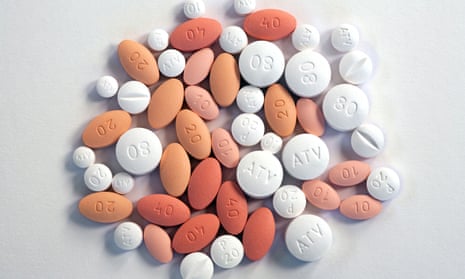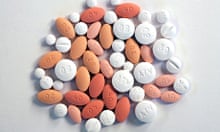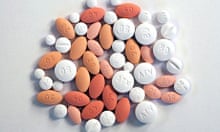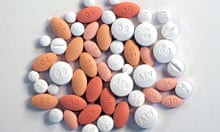Statins to lower cholesterol prevent 80,000 heart attacks and strokes every year in the UK, far outweighing the harm from rare side-effects, according to a review of the evidence which aims to put a heated controversy to rest and reassure the public that statins are safe.
The review is published by the Lancet medical journal, whose editor, Richard Horton, likened the harm done to public confidence by the critics of statins to that caused by the paper his journal published on the MMR (measles, mumps and rubella) vaccine in 1998.
“Controversy over the safety and efficacy of statins has harmed the health of potentially thousands of people in the UK,” he wrote in a comment published with the review. In six months after the publication of “disputed research and tendentious opinion” on the side-effects of statins in 2013, a study estimated that over 200,000 patients stopped taking a statin. It predicted there would be 2,000 extra heart attacks and strokes over the next decade as a result.
The Lancet was taking a stand, he said, “because of our experience of MMR. We saw in a very painful way the consequences of publishing a paper which had a huge impact on confidence in a safe and effective vaccine.
“We learned lessons from that episode and those lessons need to be widely promulgated. They are lessons for all journals and all scientists.”
The furore over statins broke out after Nice, the UK’s National Institute for Health and Clinical Excellence, advised doctors in 2013 to prescribe statins for patients with a low, 10% risk of heart disease in the next 10 years, which was half the previous level of a 20% risk. It made 4.5 million more people, who were fundamentally healthy, eligible for statins, which Nice said could prevent up to 28,000 heart attacks and 16,000 strokes each year.
The guidance, which was based on evidence from the group led by Prof Rory Collins at the clinical trials service unit at Oxford University, was questioned by the British Medical Journal, which is campaigning against the over-use of medicines and medical treatment. The BMJ ran two papers claiming statins did not reduce deaths and that the risk of side-effects outweighed the benefits.
Collins severely criticised the papers and the BMJ, arguing in the Guardian that they could harm more people than Wakefield did with his MMR paper. Wakefield suggested a link between the jab and autism, deterring some parents from having their children vaccinated.
In the light of the loss of confidence in the pills, the new review of the evidence on the benefits and side-effects, led by Collins, was intended to help doctors, patients and the public make an informed decision about statin therapy, it said.
About a third of those who have already had a heart attack or stroke and would be eligible for statins are not taking them, and that rises to a half among those in the low-risk group. Many do not want to take pills because they do not consider themselves ill, while others worry about side-effects.
The authors say the benefits of taking statins have been under-estimated while the harms have been exaggerated. Treating 10,000 high-risk patients prevents 1,000 heart attacks or strokes and treating 10,000 low-risk patients prevents 500, they say. In the UK, about 2 million people at high risk - because they have suffered a heart attack or stroke - and about 4 million at low risk take statins.
About 40,000 people in each group – a total of 80,000 – avoid potentially fatal heart attacks and strokes as a result, said Collins.
He and his fellow authors stressed that their findings were from randomised controlled trials, which have compared large groups of similar people, some on statins while others were not.
The statins critics generally cite findings from observational studies, Collins said – that is data from people who have been taking statins in the real world, but without a carefully selected comparison group who have not been on the pills. That makes it hard to tell whether any problems are actually caused by the drugs.
There are side-effects, says the review. There is a real risk of myopathy, a neuromuscular disorder which causes muscle damage. One in 10,000 people per year will develop myopathy as a result of this. Another five to 10 people will have a haemorrhagic stroke, which involves bleeding into the brain and 10 to 20 people on statins are diagnosed with diabetes.
There have been claims that as many as 20% of patients have “statin intolerance”, with claims of muscle weakness and pain. At most 10 to 20 in every 10,000 have an increase in such symptoms on the drugs, says the review.
Some GPs have been among the sceptics over statins, but Dr Maureen Baker, chair of the Royal College of GPs, said the study cut through the controversy. “It recognises the benefits that these drugs have for many patients, but also the potential side-effects that any prescribing healthcare professional should be aware of.”
GPs would never take a decision to prescribe statins lightly and should only do it after a discussion with the patient and the medication should be regularly reviewed, she said.
“We hope this research reassures patients who are on statins that in the majority of cases statins are safe and effective drugs – but in most cases where adverse side-effects are seen, these are reversible by stopping taking statins.”
Consultants spoke of struggling to persuade patients that the drugs would help them. “I often meet people who don’t want to take statins yet are happy to take other drugs with greater risks of side-effects, or take supplements with no benefit at all,” said Dr Tim Chico, a consultant cardiologist in Sheffield. “Statins have been unfairly demonised, and this prevents a sensible discussion of the risks and benefits of their use. Statins can cause side-effects, but the chance of developing these is low, while the effects of suffering the heart attack that a statin might have prevented can be fatal or life-long.”
Prof David Webb, president of the British Pharmacological Society, said: “In recent years, those of us who manage the large number of patients at excess risk of heart disease and strokes have been fighting an uphill battle to persuade them to take statins, a class of medicines that have been repeatedly shown to save lives.
“The problem has largely related to concerns about muscle aches and potentially more serious side-effects (muscle damage, diabetes and haemorrhagic stroke) that have been very well publicised on the internet.
“Many patients who have much to benefit from statins, and many of those at more modest risk, have been persuaded not to take them because of exaggerated claims of harm, and some research suggesting that the benefits have been overestimated. It is likely that many lives have been lost, based on a received view that statins are dangerous and ineffective.”







